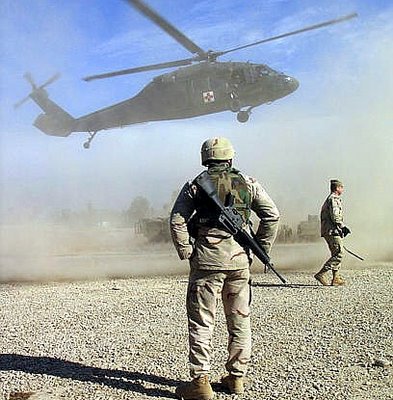2 Generals oppose elevating status of National Guard

The National Guard has provided almost half the troops in Iraq
WASHINGTON - Two senior U.S. generals said Thursday they disagree with a proposal that would elevate the chief of the National Guard to the same rank and status as the heads of the other military branches and provide the Guard with its own budget.NATO commander Gen. James L. Jones and Gen. Lance Smith, commander of Joint Forces, said the measures would complicate the military chain of command and cause disagreement between the active-duty forces and the National Guard.
"My gut feeling is that it would be divisive, and I think creating a separate service, if you will, would be counter to the good order and discipline of the armed forces in general," Jones told the Commission on the National Guard and Reserves.
With the passage of the 2007 defense bill last week, Congress asked the commission to examine the issue as it reviews the role of the National Guard and Reserves. Congress created the 13-member body last year to consider whether changes are needed in the way part-time soldiers and airmen are organized, trained, equipped and paid and in the missions they carry out.
Advocates of putting the National Guard on equal footing with the active-duty military say it would ensure that the Guard gets its fair share of funding and equipment.
Currently, the Army National Guard and the Air Force National Guard report to the Department of the Army and the Department of the Air Force, respectively. The chief of the National Guard Bureau, who oversees both Guard divisions, is a three-star general who acts as an adviser to the four-star generals who head the Army and the Air Force.
Under the proposal, however, the National Guard chief also would hold four-star status and be given a seat on the Joint Chiefs of Staff, a six-member panel that coordinates military policy, made up of a chairman, vice chairman and the chiefs of staff of the Army, Navy, Air Force and Marines.
Army and Air National Guard, with more than 455,000 troops, have provided nearly half of the combat forces in Iraq and Afghanistan, virtually all of the peacekeepers in the Balkans and thousands more for border security, disaster relief and other domestic missions.
The Iraq war has taken a toll on National Guard equipment stocks. Stateside units have only about one-third of the trucks, Humvees and other equipment they normally would have because most of their gear has been left in Iraq. The price tag for rebuilding those stocks has been estimated at $21 billion.
"It is one of the largest military forces, and it has the most missions," said John Goheen, spokesman for the National Guard Association of the United States. "Yet it has no voice at the top of the Pentagon."
Legislation proposed this year by Sen. Patrick Leahy, D-Vt., and Sen. Christopher "Kit" Bond, R-Mo., also would require that the deputy commander of U.S. Northern Command, which oversees all military operations in the United States, come from Guard's ranks.
The final version of the fiscal 2007 defense authorization bill stripped out those provisions and required only that the National Guard commission look into the issue and come up with a set of recommendations.
In a Senate floor speech last week, Leahy said that gutting the proposal signaled to the National Guard that Congress is "not interested in truly supporting them."
Read the rest at the San Jose Mercury News

<< Home